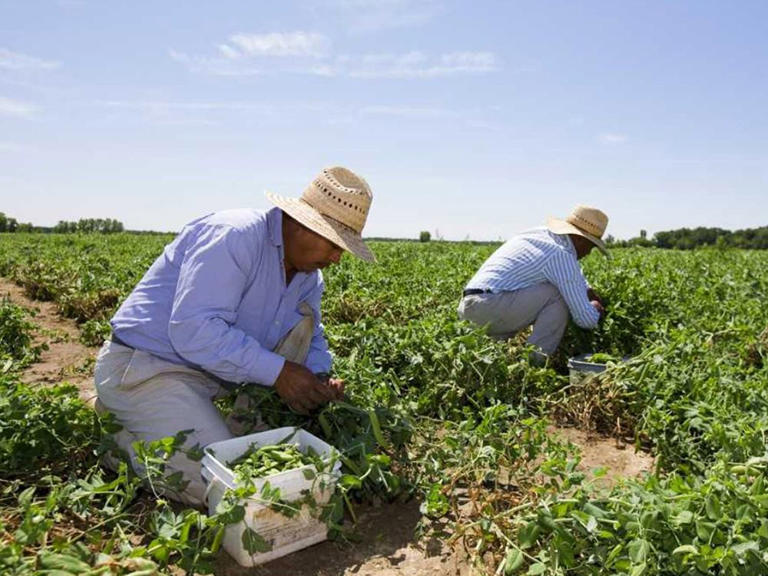Story by Bryan Passifiume • POST MEDIA

© Provided by National Post
Struggling to find workers, agricultural operators are sounding the alarm over problems with Canada’s immigration bureaucracy.
This week, the Canadian Mushroom Growers’ Association echoed concerns expressed last week by KT Ranches in National Post , claiming chronic and often inexplicable rejections of temporary foreign worker applications by Immigration, Refugees and Citizenship Canada (IRCC) are creating grief for farmers.
“We’re starting to see these mass refusals,” said Mushrooms Canada’s Janet Krayden in an interview with National Post. She said their members started getting hit with a flurry of unexplained rejections late last fall.
“This is not just cattle — this is all of ag right now.”
Last week, KT Ranches co-owner Tracey Carson spoke of their battles with IRCC’s seemingly arbitrary and often confusing rationale in approving workers.
In one case, IRCC rejected a work permit for a Kenyan-trained veterinarian hired as a herdsman at the Okanagan-based cattle ranch. He was rejected both because IRCC officers were concerned he didn’t have the ability to perform the job, and they weren’t convinced he’d leave the country after his permit expired because of “family ties” within Canada — despite him not having any family in the country.
Krayden said Canada’s mushroom farmers are experiencing the same thing, specifically concerning Vietnamese applicants inexplicably rejected for family ties within Canada, despite none of them actually having relatives in this country.
“I have two farms that are struggling right now with those kind of mass refusals from Vietnam,” she said.
“But I’ve been told by immigration consultants that this is happening (with applicants) beyond Vietnam.”
What’s even more astounding, she said, is that nearly all of the rejections found themselves inexplicably reversed upon appeal.
“We’ve never seen this before, that they would be refused because they have family in Canada,” Krayden said.
“There might be some archaic regulation that’s on the books, but it doesn’t make sense — it’s a new systemic issue that’s causing mass refusals for agriculture right now.”
Questions to IRCC by National Post weren’t returned by deadline.
Related video: Canadian government launches recognized employer pilot for temporary foreign workers (Global News) Duration 1:38 View on Watch
Despite current immigration policy listing agriculture as an “essential” occupation, Krayden said current trends suggest the exact opposite.
Data released by Mushrooms Canada earlier this year list a 12.3 per cent job vacancy rate within the industry, while some farms report vacancies far exceeding that number.
Across the entire sector, the national job vacancy rate for Canadian agricultural producers reached 5.4 per cent, according to data published online by the Canadian Agricultural Human Resource Council.
Three provinces — Prince Edward Island, Ontario and British Columbia — reported vacancy rates higher than the national average, reporting 5.71, 6.09 and 7.95 per cent respectively.
That same data suggests 47 per cent of Canada’s 192,408 farms are unable to find enough workers, and 34 per cent of farms report zero Canadians applying for posted jobs.
Thirty-five per cent of Canadian farms employ temporary foreign workers, and a little under half anticipate the need to hire more workers over the next five years.
Unlike many other agricultural operations, mushroom farming is a year-round enterprise, and therefore doesn’t rely on seasonal workers.
Of the 6,500 workers growing mushrooms in Canada, around 2,500 are temporary foreign workers, typically granted two-year work permits.
Labour shortages on Canadian mushroom farms are leading to a loss of crops and productivity, Krayden said.
Canada’s temporary foreign worker program, she said, is out-of-date — particularly since the i ntroduction of Canada’s Agri-Food immigration pilot that provides a pathway to permanent residence for qualified, non-seasonal agriculture workers.
Krayden said the organization met with IRCC officials over the summer to air their concerns.
“We’re still asking them to resolve it, but they keep saying, ‘We can’t see any reason that’s provoking this.’ But they’re not helping,” she said.
Errors by IRCC officers are also sparking concern.
Last week, Carson, of KT Ranches, told National Post of mistakes made by IRCC officers preventing the family of one of her herd managers from applying for a visa.
Krayden said such errors are becoming more frequent — particularly when processing extensions for workers already in Canada.
“They make the same mistakes again and again and again,” she said, reporting applications being held up because of errors like incorrect dates or work permits being issued with wrong job classifications.
“They’re causing all of these work processing issues for themselves, and it’s bogging the entire system down,” she said.
“The seasonal ag worker program brings in like 60,000 workers on an annual basis in Canada, but our farms aren’t like that — we don’t have this seasonal push.”
• Email: bpassifiume@postmedia.com | Twitter: bryanpassifiume
No comments:
Post a Comment